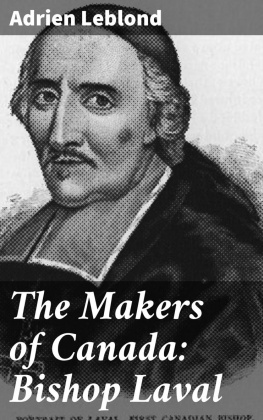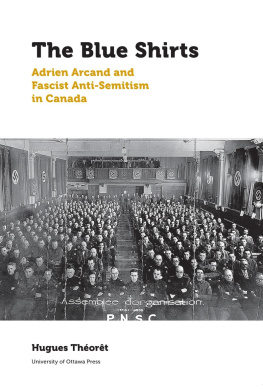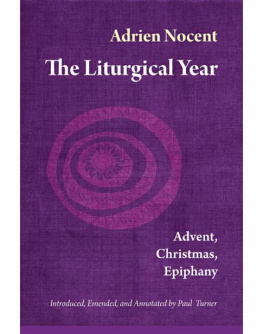CHAPTER I
Table of Contents
ESTABLISHMENT OF THE CATHOLIC CHURCH IN CANADA
Table of Contents
If , standing upon the threshold of the twentieth century, we cast a look behind us to note the road traversed, the victories gained by the great army of Christ, we discover everywhere marvels of abnegation and sacrifice; everywhere we see rising before us the dazzling figures of apostles, of doctors of the Church and of martyrs who arouse our admiration and command our respect. There is no epoch, no generation, even, which has not given to the Church its phalanx of heroes, its quota of deeds of devotion, whether they have become illustrious or have remained unknown.
Born barely three centuries ago, the Christianity of New France has enriched history with pages no less glorious than those in which are enshrined the lofty deeds of her elders. To the list, already long, of workers for the gospel she has added the names of the Rcollets and of the Jesuits, of the Sulpicians and of the Oblate Fathers, who crossed the seas to plant the faith among the hordes of barbarians who inhabited the immense regions to-day known as the Dominion of Canada.
And what daring was necessary, in the early days of the colony, to plunge into the vast forests of North America! Incessant toil, sacrifice, pain and death in its most terrible forms were the price that was gladly paid in the service of God by men who turned their backs upon the comforts of civilized France to carry the faith into the unknown wilderness.
Think of what Canada was at the beginning of the seventeenth century! Instead of these fertile provinces, covered to-day by luxuriant harvests, man's gaze met everywhere only impenetrable forests in which the woodsman's axe had not yet permitted the plough to cleave and fertilize the soil; instead of our rich and populous cities, of our innumerable villages daintily perched on the brinks of streams, or rising here and there in the midst of verdant plains, the eye perceived only puny wigwams isolated and lost upon the banks of the great river, or perhaps a few agglomerations of smoky huts, such as Hochelaga or Stadacon; instead of our iron rails, penetrating in all directions, instead of our peaceful fields over which trains hasten at marvellous speed from ocean to ocean, there were but narrow trails winding through a jungle of primeval trees, behind which hid in turn the Iroquois, the Huron or the Algonquin, awaiting the propitious moment to let fly the fatal arrow; instead of the numerous vessels bearing over the waves of the St. Lawrence, at a distance of more than six hundred leagues from the sea, the products of the five continents; instead of yonder floating palaces, thronged with travellers from the four corners of the earth, then only an occasional bark canoe came gliding slyly along by the reeds of the shore, scarcely stopping except to permit its crew to kindle a fire, to make prisoners or to scalp some enemy.
A heroic courage was necessary to undertake to carry the faith to these savage tribes. It was condemning one's self to lead a life like theirs, of ineffable hardships, dangers and privations, now in a bark canoe and paddle in hand, now on foot and bearing upon one's shoulders the things necessary for the holy sacrament; in the least case it was braving hunger and thirst, exposing one's self to the rigours of an excessive cold, with which European nations were not yet familiar; it often meant hastening to meet the most horrible tortures. In spite of all this, however, Father Le Caron did not hesitate to penetrate as far as the country of the Hurons, while Fathers Sagard and Viel were sowing the first seeds of Christianity in the St. Lawrence valley. The devotion of the Rcollets, to the family of whom belonged these first missionaries of Canada, was but ill-rewarded, for, after the treaty of St. Germain-en-Laye, which restored Canada to France, the king refused them permission to return to a region which they had watered with the sweat of their brows and fertilized with their blood.
The humble children of St. Francis had already evangelized the Huron tribes as far as the Georgian Bay, when the Company of the Cent-Associs was founded by Richelieu. The obligation which the great cardinal imposed upon them of providing for the maintenance of the propagators of the gospel was to assure the future existence of the missions. The merit, however, which lay in the creation of a society which did so much for the furtherance of Roman Catholicism in North America is not due exclusively to the great cardinal, for Samuel de Champlain can claim a large share of it. "The welfare of a soul," said this pious founder of Quebec, "is more than the conquest of an empire, and kings should think of extending their rule in infidel countries only to assure therein the reign of Jesus Christ."
Think of the suffering endured, in order to save a soul, by men who for this sublime purpose renounced all that constitutes the charm of life! Not only did the Jesuits, in the early days of the colony, brave horrible dangers with invincible steadfastness, but they even consented to imitate the savages, to live their life, to learn their difficult idioms. Let us listen to this magnificent testimony of the Protestant historian Bancroft:
"The horrors of a Canadian life in the wilderness were resisted by an invincible, passive courage, and a deep, internal tranquillity. Away from the amenities of life, away from the opportunities of vain-glory, they became dead to the world, and possessed their souls in unalterable peace. The few who lived to grow old, though bowed by the toils of a long mission, still kindled with the fervour of apostolic zeal. The history of their labours is connected with the origin of every celebrated town in the annals of French Canada; not a cape was turned nor a river entered but a Jesuit led the way."
Must we now recall the edifying deaths of the sons of Loyola, who brought the glad tidings of the gospel to the Hurons?Father Jogues, who returned from the banks of the Niagara with a broken shoulder and mutilated hands, and went back, with sublime persistence, to his barbarous persecutors, to pluck from their midst the palm of martyrdom; Father Daniel, wounded by a spear while he was absolving the dying in the village of St. Joseph; Father Brbeuf, refusing to escape with the women and children of the hamlet of St. Louis, and expiring, together with Father Gabriel Lalemant, in the most frightful tortures that Satan could suggest to the imagination of a savage; Father Charles Garnier pierced with three bullets, and giving up the ghost while blessing his converts; Father de Noue dying on his knees in the snow!
These missions had succumbed in 1648 and 1649 under the attacks of the Iroquois. The venerable founder of St. Sulpice, M. Olier, had foreseen this misfortune; he had always doubted the success of missions so extended and so widely scattered without a centre of support sufficiently strong to resist a systematic and concerted attack of all their enemies at once. Without disapproving the despatch of these flying columns of missionaries which visited tribe after tribe (perhaps the only possible method in a country governed by pagan chiefs), he believed that another system of preaching the gospel would produce, perhaps with less danger, a more durable effect in the regions protected by the flag of France. Taking up again the thought of the Benedictine monks, who have succeeded so well in other countries, M. Olier and the other founders of Montreal wished to establish a centre of fervent piety which should accomplish still more by example than by preaching. The development and progress of religious work must increase with the material importance of this centre of proselytism. In consequence, success would be slow, less brilliant, but surer than that ordinarily obtained by separate missions. This was, at least, the hope of our fathers, and we of Quebec would seem unjust towards Providence and towards them if, beholding the present condition of the two seminaries of this city, of our Catholic colleges, of our institutions of every kind, and of our religious orders, we did not recognize that their thought was wise, and their enterprise one of prudence and blessed by God.











